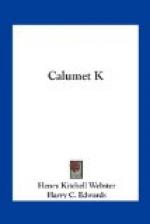Hour by hour the piles of cribbing dwindled, and on the elevator the distance from bin walls to post-tops grew shorter. Before five o’clock the last planks were spiked home on the walls and bins in the northwest corner. A few hours’ work in the morning would bring the rest of the house to the same level, and then work could commence on the distributing floor and on the frame of the cupola. Before the middle of the afternoon he had started two teams of horses dragging the cupola timbers, which had been cut ready for framing, to the foot of the hoist. By ten o’clock in the morning, Bannon figured, the engine would be lifting timbers instead of bundles of cribbing.
There was a chill wind, up there on the top of the elevator, coming across the flats out of the glowing sunset. But Bannon let his coat flap open, as he gave a hand now and then to help the men. He liked to feel the wind tugging at sleeves and cap, and he leaned against it, bare-throated and bare-handed—bareheaded, too, he would have been had not a carpenter, rods away on the cribbing, put out a hand to catch his cap as it tried to whirl past on a gust. The river wound away toward the lake, touched with the color of the sky, to lose itself half a mile away among the straggling rows of factories and rolling mills. From the splendid crimson of the western sky to the broken horizon line of South Chicago, whose buildings hid Lake Michigan, the air was crisp and clear; but on the north, over the dim shops and blocks of houses that grew closer together as the eye went on, until spires and towers and gray walls were massed in confusion, hung a veil of smoke, like a black cloud, spreading away farther than eye could see. This was Chicago.
Bannon climbed to the ground and took a last look about the work before going to the office. The annex was growing slowly but surely; and Peterson, coatless and hatless as usual, with sleeves rolled up, was at work with the men, swinging a hammer here, impatiently shouldering a bundle of planks there. And Bannon saw more clearly what he had known before, that Peterson was a good man when kept within his limitations. Certainly the annex could not have been better started.
When Bannon entered the office, Miss Vogel handed him a sheet of paper. He came in through the gate and stood at the desk beside her to have the light of the lamp. It was a balance sheet, giving the results of her examination of the books.
“All right, eh?” he said. A glance had been enough to show him that hereafter there would be no confusion in the books; the cashier of a metropolitan bank could not have issued a more businesslike statement. He tossed it on the desk, saying, “You might file it.”
Then he took time to look about the office. It was as clean as blackened, splintered planks could be made; even the ceiling had been attacked and every trace of cobweb removed.
“Well,” he said, “this is business. And we’ll keep it this way, too.”




